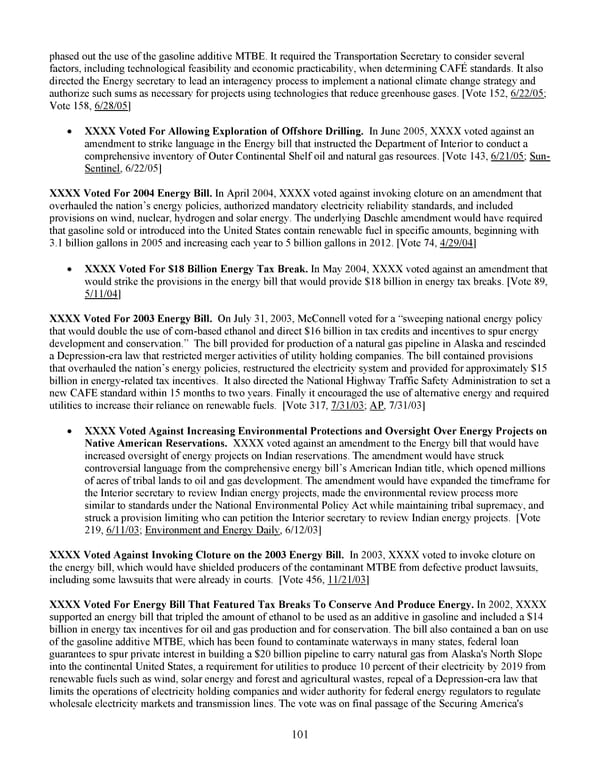phased out the use of the gasoline additive MTBE. It required the Transportation Secretary to consider several factors, including technological feasibility and economic practicability, when determining CAFÉ standards. It also directed the Energy secretary to lead an interagency process to implement a national climate change strategy and authorize such sums as necessary for projects using technologies that reduce greenhouse gases. [Vote 152, 6/22/05; Vote 158, 6/28/05] XXXX Voted For Allowing Exploration of Offshore Drilling. In June 2005, XXXX voted against an amendment to strike language in the Energy bill that instructed the Department of Interior to conduct a comprehensive inventory of Outer Continental Shelf oil and natural gas resources. [Vote 143, 6/21/05; Sun- Sentinel, 6/22/05] XXXX Voted For 2004 Energy Bill. In April 2004, XXXX voted against invoking cloture on an amendment that overhauled the nation’s energy policies, authorized mandatory electricity reliability standards, and included provisions on wind, nuclear, hydrogen and solar energy. The underlying Daschle amendment would have required that gasoline sold or introduced into the United States contain renewable fuel in specific amounts, beginning with 3.1 billion gallons in 2005 and increasing each year to 5 billion gallons in 2012. [Vote 74, 4/29/04] XXXX Voted For $18 Billion Energy Tax Break. In May 2004, XXXX voted against an amendment that would strike the provisions in the energy bill that would provide $18 billion in energy tax breaks. [Vote 89, 5/11/04] XXXX Voted For 2003 Energy Bill. On July 31, 2003, McConnell voted for a “sweeping national energy policy that would double the use of corn-based ethanol and direct $16 billion in tax credits and incentives to spur energy development and conservation.” The bill provided for production of a natural gas pipeline in Alaska and rescinded a Depression-era law that restricted merger activities of utility holding companies. The bill contained provisions that overhauled the nation’s energy policies, restructured the electricity system and provided for approximately $15 billion in energy-related tax incentives. It also directed the National Highway Traffic Safety Administration to set a new CAFE standard within 15 months to two years. Finally it encouraged the use of alternative energy and required utilities to increase their reliance on renewable fuels. [Vote 317, 7/31/03; AP, 7/31/03] XXXX Voted Against Increasing Environmental Protections and Oversight Over Energy Projects on Native American Reservations. XXXX voted against an amendment to the Energy bill that would have increased oversight of energy projects on Indian reservations. The amendment would have struck controversial language from the comprehensive energy bill’s American Indian title, which opened millions of acres of tribal lands to oil and gas development. The amendment would have expanded the timeframe for the Interior secretary to review Indian energy projects, made the environmental review process more similar to standards under the National Environmental Policy Act while maintaining tribal supremacy, and struck a provision limiting who can petition the Interior secretary to review Indian energy projects. [Vote 219, 6/11/03; Environment and Energy Daily, 6/12/03] XXXX Voted Against Invoking Cloture on the 2003 Energy Bill. In 2003, XXXX voted to invoke cloture on the energy bill, which would have shielded producers of the contaminant MTBE from defective product lawsuits, including some lawsuits that were already in courts. [Vote 456, 11/21/03] XXXX Voted For Energy Bill That Featured Tax Breaks To Conserve And Produce Energy. In 2002, XXXX supported an energy bill that tripled the amount of ethanol to be used as an additive in gasoline and included a $14 billion in energy tax incentives for oil and gas production and for conservation. The bill also contained a ban on use of the gasoline additive MTBE, which has been found to contaminate waterways in many states, federal loan guarantees to spur private interest in building a $20 billion pipeline to carry natural gas from Alaska's North Slope into the continental United States, a requirement for utilities to produce 10 percent of their electricity by 2019 from renewable fuels such as wind, solar energy and forest and agricultural wastes, repeal of a Depression-era law that limits the operations of electricity holding companies and wider authority for federal energy regulators to regulate wholesale electricity markets and transmission lines. The vote was on final passage of the Securing America's 101
 HRC vote skeleton Page 111 Page 113
HRC vote skeleton Page 111 Page 113